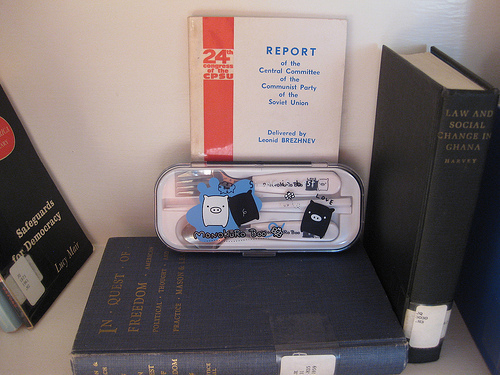Jeff VanderMeer's Blog, page 90
July 17, 2010
Reading This Thurs with Ballingrud and Koja (and Things You Don't Expect to Find in Your Cottage)

(Communism and cute Japanese critters–all for you.)
For the third year as assistant director, I'm at the Shared Worlds teen SF/F writing camp, hosted by Wofford College, here in Spartanburg, South Carolina. Tomorrow the students will get here and the fun will begin. I'm staying in this nice cottage, which, as documented above, contains some things I wouldn't expect to find all in the same place.
This Thursday night at the Hub City Bookstore at 6pm, in downtown Spartanburg, I will be reading...
Launch Pad, Day Five Catch-up, Kevin Grazier on Extrasolar Planets
To see the rest of my Launch Pad entries, click here.
When we talked about planetary formation, we said Jovial planets were far out.
But when we started looking around the universe, the first planets we found were Jovial planets near stars. They're called hot Jupiters. They're puzzling. We don't exactly know why they happen.
Currently our detection techniques are wildly biased toward big planets, and planets close to stars. As we improve our detection criteria, we are able to look for smaller, ...
July 16, 2010
Launch Pad, Day Five, Mike Brotherton on resources about exoplanets
This is one of the fastest changing fields, so you can't stay up to date from text books.
Mike's online resources on exoplanets, including videos and video lectures
To see the rest of my Launch Pad posts, click here.
There's also a website with a list of all the different kinds of planets we've found, including (but not limited to) earth-like planets.
There are two more links Mike likes for cataloging planets and their properties:
exoplanets.org, basic catalog information, and sortable.
Also...
Launch Pad, Day Five: Kevin R. Grazier on Fermi and Drake
To see the rest of my Launch Pad posts, click here.
The Fermi paradox starts with discussions at the manhattan project. One day when extra-terrestrials came up, Fermi asked, "Where are they?"
Or, expanded, "The apparent size and age of the universe suggest that many technologically advanced extraterrestrial civilizations ought to exist. However, this hypothesis seems inconsistent with the lack of observational evidence to support it." (The wiki on this looks like it might be interesting, so...
Launch Pad, Day Five: Mike Brotherton on Summing Up Stars, and Moving on to Galaxies
To see the rest of my Launch Pad posts, click here.
OK, let's get back to the destruction of the Earth.
The fate of our sun and the end of the earth–earth will be incinerated when the sun becomes a red giant, unless we find a way to move the earth. We have about five billion years before that happens.
Now let's talk about massive stars, stars greater than four solar masses.The most massive stars can continue fusing elements and releasing energy all the way to iron. The most massive O stars can ...
Launch Pad, Day Four (posted late), Kevin R. Grazier on Science in Science Fiction
To see the rest of my Launch Pad posts, click here.
Man, I didn't realize how long these were. I pasted the last one into word to check something and it was and a half pages long.
The back of the envelope calculation–scribbling down approximations in an equation and working it out to see if your guessed answer puts you in the right general range of where you should be. He cites an example from Battlestar Gallactica where he did some rough math to check to see whether someone would survive a h...
July 15, 2010
Launch Pad, Day Four: Mike Brotherton, More on Stars…
To see the rest of my Launch Pad posts, click here.
Stephanie came up to me after the last lecture, and we discussed cultural construction of p-prim a little more. I feel more comfortable with her conclusions now; she says she is looking at how often the research pops up in different settings, and is aware of the fact that many scientists in her field (and others) have a tendency to forget that things need to be seen cross-culturally before they can be diagnosed as human traits. At any rate...
Launch Pad Day Four, Stephanie Slater on If Galileo Had Known Cognitive Psychology, They Wouldn't Have Locked Him Up
To read the rest of my Launch Pad posts, click here.
Galileo was a typical astronomer/physicist who believed that if you just give people the facts, they'll believe you. He had great facts and a beautiful story. What Galileo did as we know is that he made some observations using the telescope, and was the first one to write down his observations "loudly," and he said that instead of there just being 3000 stars that you can see with your naked eye, there are more than you can imagine. It's...
Launch Pad Day Four, Catch-up Post: Genevieve Valentine Writes about Jim Verley on Science Education
To see the rest of my posts about Launch Pad, click here.
Yesterday, I went home to sleep for a bit during the last lecture of the day. The perpetually chic and brilliant author Genevienve Valentine was kind enough to take notes in my stead. (She's available in blog form, and twitter form, and is blogging some about Launch Pad at Tor.com, in addition to her usual movie reviews.) Thanks, Genevieve!
The discussion I missed looks pretty cool, actually. I particularly like Marjorie Liu's thinking a...
July 14, 2010
Launch Pad, Day Three: Placeholder
I have a bad cold and checked out of the day's final lecture from Jim Verley on science education, STEM fields, and science fiction. Genevieve Valentine kindly wrote up some notes which I'll put online as time permits.
I wanted to make sure to rest up because tonight the class is heading up to see the WIRO telescope, which is the same size as Hubble, and which has everyone excited.



